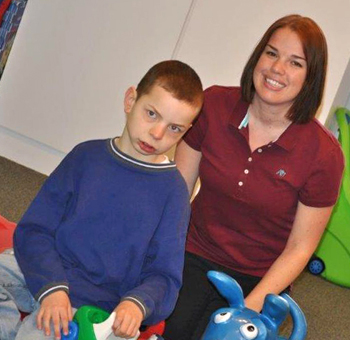
|
Pediatric Occupational, Physical, ABA/Behavioral, Feeding, Speech, and Language Therapies Main Clinic: 931-372-2567 1445 East 10th Street Cookeville, TN 38501 Email: [email protected] HIPAA Secure Email: [email protected] Fax: (931) 372-2572 ABA Clinic: 931-201-9534 400 Dubois Road Cookeville, TN 38501 Email: [email protected] Please call today to get started! Most insurances accepted! |

|
| Who needs therapy? | SE HABLA ESPAÑOL |
|
Home
>
Vision is more than seeing 20/20
> Brain Injury and Vision Therapy
Brain Injury and Vision TherapyFor Patients and Families |
Related Topics: |
Acquired Brain Injury can come in many forms. Below are some common diagnoses:
- Traumatic Brain Injury
- Mild Acquired Brain Injury
- Mild Closed Head Injury
- Post-Concussive Syndrome
- Cervical Trauma Syndrome
- Post Traumatic Vision Syndrome
- Stroke
- Cerebral Palsy
- Cerebral Vascular Accidents
Acquired Brain Injury is an insult to the brain. It can result from a difficult birth, in-utero, accident, blow to the head, stroke or neurological dysfunction. This can produce diminished or altered state of consciousness, and may result in impairments of cognitive abilities, sensory processing and/or physical function. Impairments may be mild or severe but most are amenable to rehabilitation.
Specific effects can be:
- Disturbance of behavioral or emotional functioning
- Physiological maladjustment
- Visual Dysfunction
- Hidden Visual Problems
- Primitive reflexes returning or not integrating properly
- Sensory processing issues and hyper-registration of sensory stimuli
Vision is the most important source of sensory information. Consisting of a sophisticated complex of subsystems, the visual process involves the flow and processing of information to the brain. Because there is a close relationship between vision and the brain, Acquired Brain Injury can disrupt the visual process, interfering with the flow and processing of information. The result is a huge vision problem but the right treatment is often missed- seeing an eye doctor with advanced training in neuro-visual therapy is vital to successful rehab!
Symptons indicating a vision problem are:
- Blurred vision
- Sensitivity to light
- Reading difficulties Comprehension difficulty
- Attention and concentration difficulty
- Memory difficulty
- Double vision
- Aching eyes
- Headaches with visual tasks
- Loss of visual field
- Loss of balance
- Poor fine and gross motor function
Optometry and Rehabilitation
Very few in the health care professions, including head trauma rehabilitation centers, are adequately aware of visual problems resulting from Acquired Brain Injury and the visual-perceptual consequences. Unfortunately, this creates a gap in rehabilitative services, resulting incomplete treatment and frustration for the patient, family and treatment team.
The vision care professional can play an important role in the rehabilitation effort. Through neural- vision therapy and the proper use of lenses, a neuro-developmental optometrist specifically trained to work with Acquired Brain Injury patients can help improve the flow and processing of information between the eyes and the brain.
What is Neuro-Optometric Rehabilitation?
Neuro-Optometric Rehabilitation is based upon the core principle that vision is a learned process and can be developed or enhanced at any age. Optometrists practicing this method have continued their education beyond the basic Doctor of Optometry (O.D.) degree. This continuing education emphasizes the use of lenses, prisms’ and vision therapy to enhance a patient’s visual capabilities, reduce visual stress, prevent and rehabilitate vision problems. As a member of the rehabilitative vision team, neuro development optometrists have extensive experience treating the vision problems stemming from Acquired Brain Injury.
To learn more go to: www.covd.org or email Dr. Clopton [email protected]
Site empowered by
WebOnTheFly